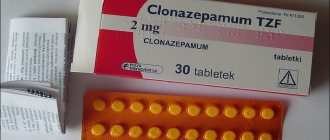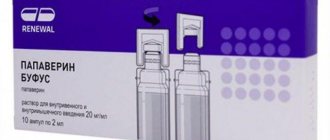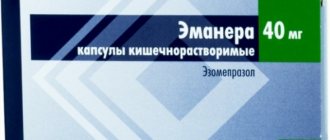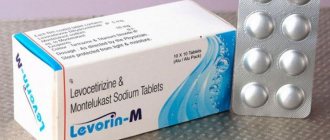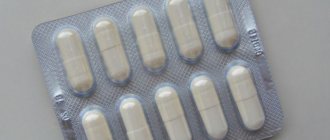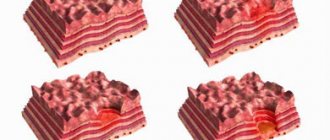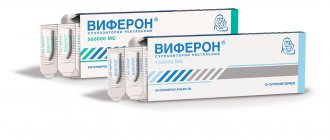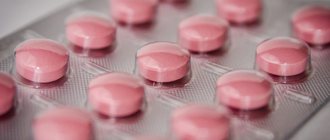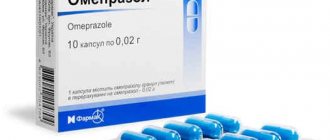Pharmacological properties
The drug is of animal origin and has an antitoxic effect.
It is well tolerated by patients and has almost no contraindications. Thanks to its immunomodulatory properties, it normalizes nitrogen metabolism, strengthens the immune system, improves liver function, and eliminates toxicosis during early pregnancy. Stabilizes hepatocyte membranes and normalizes protein metabolism. For malignant neoplasms in inoperable patients, it improves the functioning of the digestive system, as medical studies show. Eliminates inflammatory processes in the lungs during complex therapy and in severe cases of tuberculosis and pneumonia. During chemotherapy, Splenin accelerates the positive dynamics of cancer therapy.
The anti-inflammatory properties of Splenin are effective in the treatment of dermatological diseases. Shows pronounced antiallergic activity. It has detoxifying, immunomodulatory and antioxidant properties, which is effective in the treatment of severe hepatitis.
Increases the level of lysozyme and serum immunoglobulins, increases the concentration of multireceptor/active T-lymphocytes, and makes the process of restoring immune hemostasis more effective.
The anti-inflammatory properties of Splenin are effective in the treatment of dermatological diseases. Shows pronounced antiallergic activity. It has detoxifying, immunomodulatory and antioxidant properties, which is effective in the treatment of severe hepatitis.
Splenin instructions for use
Splenin instructions for use
There are no reported serious side effects of L-theanine.
Pharmacological group
- Medicines that primarily affect tissue metabolic processes
- Biogenic stimulants
The first thermometer designed to measure human body temperature was created in 1641 at the court of Ferdinand II, Holy Roman Emperor. The device was used only by the nobility, and it was made in the form of a small frog, and attached to the human body with a plaster. – “Update”
Pharmacological properties
The drug is of animal origin and has an antitoxic effect. It is well tolerated by patients and has almost no contraindications. Thanks to its immunomodulatory properties, it normalizes nitrogen metabolism, strengthens the immune system, improves liver function, and eliminates toxicosis during early pregnancy. Stabilizes hepatocyte membranes and normalizes protein metabolism.
For malignant neoplasms in inoperable patients, it improves the functioning of the digestive system, as medical studies show. Eliminates inflammatory processes in the lungs during complex therapy and in severe cases of tuberculosis and pneumonia. During chemotherapy, Splenin accelerates the positive dynamics of cancer therapy.
The anti-inflammatory properties of Splenin are effective in the treatment of dermatological diseases. Shows pronounced antiallergic activity. It has detoxifying, immunomodulatory and antioxidant properties, which is effective in the treatment of severe hepatitis.
Increases the level of lysozyme and serum immunoglobulins, increases the concentration of multireceptor/active T-lymphocytes, and makes the process of restoring immune hemostasis more effective.
Acidin-pepsin
The effect of the drug Acidin-pepsin is due to the properties of its two components. Pepsin is a digestive enzyme. In the human body, it is produced from the inactive proenzyme pepsinogen in the mucous membranes of the stomach. Pepsin is involved in the initial stage of digestion of proteins into peptides and is destroyed in the duodenum under the action of the pancreas. Acidine or betaine hydrochloride increases the acidity of gastrointestinal juice to the optimal level necessary for pepsin activity. In terms of acidity, 0.4 g of the component corresponds to 16 drops of hydrochloric acid. Acidine is destroyed in the stomach during hydrolysis with the release of free hydrochloric acid. The combined preparation contains 1 part pepsin and 4 parts acidin.
Indications for use: Acidin-pepsin is prescribed for diseases that are accompanied by a decrease in the level of hydrochloric acid in the stomach. The drug is effective for hypocidal gastritis, when hydrochloric acid is produced in insufficient quantities, and for anacid gastritis, when there is practically no acid. Normally, the acidic environment in the stomach provides not only the breakdown of proteins, but also a bactericidal effect. In turn, low acidity promotes the accumulation of protein breakdown products and increases the risk of developing infectious and even oncological diseases of the stomach. Therefore, the drug is also prescribed for inflammation of the stomach, which is accompanied by low acidity. The drug has proven effective in treating achylia - a complete lack of secretion of hydrochloric acid and enzymes. The instructions for Acidin Pepsin also recommend the drug for any digestive disorder associated with low acidity - difficult and painful digestion, heaviness in the stomach, early satiety, fullness of the stomach, bloating and other pathological phenomena.
Indications for use
Main indications of the drug Splenin:
- gestosis;
- dystrophic epidermolysis;
- parapsoriasis;
- furunculosis;
- Quincke's edema;
- keloid;
- atopic dermatitis;
- pityriasis versicolor;
- hives;
- skin atrophy;
- childhood abscess;
- hepatitis (chronic and acute);
- fatty hepatosis;
- toxicosis during early pregnancy;
- viral and inflammatory diseases of the respiratory system;
- functional disorders of the parathyroid glands;
- oncological diseases.
Similar drugs:
- Calcium gluconate Chewable tablets
- Duphalac Syrup
- Reosorbilact Solution for infusion
- Legalon 140 Capsule
- Rheopolyglukin Solution for infusion
- Dialipon Capsule
- Neurolipon Capsule
- Agri for children (Agri filii) Lozenges
- Sodium thiosulfate Substance-powder
- Glucose Substance-powder
** The Drug Directory is intended for informational purposes only. For more complete information, please refer to the manufacturer's instructions. Do not self-medicate; Before starting to use the drug Splenin, you should consult a doctor. EUROLAB is not responsible for the consequences caused by the use of information posted on the portal. Any information on the site does not replace medical advice and cannot serve as a guarantee of the positive effect of the drug.
Are you interested in the drug Splenin? Do you want to know more detailed information or do you need a doctor's examination? Or do you need an inspection? You can make an appointment with a doctor - the Euro lab is always at your service! The best doctors will examine you, advise you, provide the necessary assistance and make a diagnosis. You can also call a doctor at home . Euro lab clinic is open for you around the clock.
** Attention! The information presented in this medication guide is intended for medical professionals and should not be used as a basis for self-medication. The description of the drug Splenin is provided for informational purposes and is not intended for prescribing treatment without the participation of a doctor. Patients need to consult a specialist!
If you are interested in any other drugs and medications, their descriptions and instructions for use, information about the composition and form of release, indications for use and side effects, methods of use, prices and reviews of drugs, or you have any other questions and suggestions - write to us, we will definitely try to help you.
Directions for use and doses
Splenin is administered slowly, over 3-5 minutes.
Recommended dosages:
During early pregnancy with toxicosis:
- I degree - for 5-10 days, once a day, 1 ml of solution;
- II degree - for 10-15 days, one injection of 4 ml;
- III degree - for 15 days, 2 ml twice a day with a further reduction in dosage.
The general therapeutic course for toxicosis is no more than 30 days.
Splenin solution in case of functional disorders of the parathyroid glands should be administered for 10 days once or twice a day, 1 ml.
For chemotherapy - 2 ml twice a day (30-40 minutes after irradiation).
When treating viral and inflammatory diseases of the respiratory system, 2-4 ml should be administered twice a day. The general therapeutic course is 14-20 days.
Splenopid is a new promising immunomodulator
Published in the journal: “NEW MEDICINES” »» No. 3/2003 A. B. Tsypin, professor, academician of the Russian Academy of Natural Sciences, Dr. med. sciences
The spleen is a source of a large number of biologically active substances. The cells of this organ produce opsonins (tuftsin, fibronectin, etc.), a large complex of cytokines (IL-1, IL-2, IL-3, IL-4, IL-6, IL-8, IL-10, TNF, granulocyte- macrophage colony-stimulating factor, interferon-gamma) and possibly other peptides that are regulators of the body's immune system.
Interest in using spleen tissue to obtain a drug arose a long time ago. In the 50s of the 20th century, the American researcher G. Ungar. He received 2 drugs from the spleen: splenin A and splenin B.
The first of them reduces capillary permeability and increases the resistance of red blood cells to the action of anti-erythrocyte serum. The action of splenin B has the opposite direction. The German professor E. Schlifacke obtained the drug splenotrate from tissue, also known as prosplen, which was successfully used to treat gastritis and allergic diseases. In Switzerland, by dialysis of a spleen extract, the drug solcosplen was obtained, which stimulates sexual functions and normalizes the activity of the gonads. It was used to treat both men and women.
Splenin, obtained in 1945 by Academician V.P. Komisarenko, has found wide application in healthcare practice. The preparation contains peptides containing 13 amino acids, many fatty acids, lipids, and microelements. Splenin has pronounced detoxifying properties. It was used for toxicosis of pregnancy, hepatitis, thyrotoxicosis, schizophrenia, diabetes, allergic rhinitis, urticaria and allergic dermatitis. The active principle of splenin has not been identified. The mechanism of many of its effects has not been established.
Most drugs obtained from spleen tissue have been used to treat diseases not associated with disorders of the immune system. Many of these drugs are not currently used in clinical practice.
In 1983, at the Research Institute of Transplantology and Artificial Organs of the Ministry of Health of the Russian Federation, a method of extracorporeal connection of the xenospleen (porcine) was developed and then introduced into wide clinical practice, as well as the introduction of splenoperfusate (saline solution passed through the vascular bed of the xenospleen; administered to the patient intravenously, drip in a volume of 200 – 500 ml) for various pathologies associated with immune deficiency, in particular, with purulent-septic processes, autoimmune diseases (rheumatoid polyarthritis, systemic lupus erythematosus, psoriasis), infectious allergic bronchial asthma.
Subsequently, the NIIT and IO Ministry of Health of the USSR developed methodological recommendations “Treatment of septic diseases by connecting the xenospleen” No. 10-11/37 dated March 15, 1988, “Essential methods in the treatment of psoriasis and atopic dermatitis” No. 98/47 dated April 15, 1998 g., “Treatment of infectious-allergic bronchial asthma with extracorporeal connection of donor xenospleen” No. 10-11/62 dated 06.21.91, “Use of cryopreserved xenospleen fragments in intensive perfusion treatment of peritonitis” No. ))) dated 06.21.91, “Immunological and antiseptic capabilities of donor pig spleen in the treatment of purulent-septic diseases” No. 95/41 dated June 13, 1995. The methods described in them are used in more than a hundred cities in Russia and the CIS. On the application of methods for connecting the xenospleen and the use of splenoperfusate from 1983 to 2001. 7 doctoral and 13 candidate dissertations were defended. These methods have been shown to be highly effective. The mortality rate of patients with purulent-septic diseases, according to health care facilities, decreased by 1.5 - 2.3 times.
However, despite the high efficiency of these methods, they have limitations for their everyday and widespread use. It is not always possible to find pigs suitable for collecting the spleen at the meat processing plant at the right time; special training is required for the doctor and nurse collecting the organ. Therefore, in 1990, at the NIIT and IO of the USSR Ministry of Health, a technology was created for obtaining a drug from spleen tissue that has immunocorrective properties, is effective, sterile and can be stored for a long time. The drug was named Splenopid .
Splenopid successfully passed clinical trials and was registered by the Ministry of Health of the Russian Federation on January 19, 2002. Registration certificate number 001938/01-2002. The drug is patented.
Splenopid is a peptide fraction isolated from the spleen tissue of pigs or cattle. Pharmacotherapeutic group – immunomodulator. Has an immunostimulating effect. Activates cellular and humoral immunity, providing an increase in the specific and nonspecific resistance of the body.
